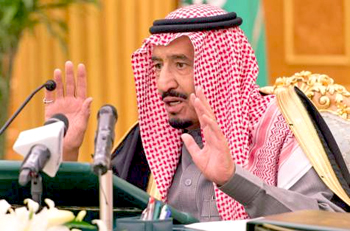
Singapore, Jan 23: Saudi Arabia’s new king is expected to stick to an OPEC policy of keeping oil output steady to protect the cartel’s market share from rival producers, even as energy markets face some of the biggest shifts in decades.
Saudi Arabia’s King Abdullah died early on Friday and his brother Salman became king, the royal court said in an official statement.
Salman has named his half-brother Muqrin as his crown prince and heir, rapidly moving to forestall any fears of a succession crisis at a moment when Saudi Arabia faces unprecedented turmoil on its borders.
The new king is expected to broadly continue Abdullah’s policies, analysts say.
“King Abdullah was the architect of the current strategy to keep production high and force out smaller players instead of cutting,” said John Kilduff, partner, Again Capital LLC in New York.
Kilduff said that Salman was known as a defender of Saudi Arabia’s interests and that the market would expect him to keep production high.
FGE analyst Tushar Bansal said: “By and large, as of now no major change is expected in Saudi policies” but he said the market would focus on whether Saudi Arabia’s oil minister might be replaced.
“Ali Al Naimi has been the oil minister since 1995.
Previously, it was reported that he expressed a desire to step down, but King Abdullah asked him to stay on for as long as he is around.
“So, the real question is, if there is a new oil minister soon, will it lead to a change in Saudi energy policy?”.
Crude oil futures initially jumped on Friday but then came off highs and were still trading at levels more than 50 per cent below their most recent peaks in June, 2014.
LAST SUCCESSION
A continuation of existing policies would be in line with what happened after the last succession. In 2005, when King Fahd died, similar concerns over Saudi Arabia’s leadership emerged.
Following the announcement of King Fahd’s death on August 1 2005, Brent rose to an all-time high of almost $61 a barrel.
Crown Prince Abdullah, who had effectively been in charge since Fahd suffered a stroke in 1995, was installed as new king and swiftly calming traders officials stressed that there would be no changes in an oil policy of keeping markets were well-supplied.
HUGE MARKET SHIFTS
Friday’s announcement of King Abdullah’s death comes amid some of the biggest shifts in oil markets in decades.
Oil prices have halved on the back of soaring supplies coupling with cooling demand due to economic slowdown in Europe and Asia, and because of improvements in energy efficiency, meaning producers are earning sharply lower revenues.
As a result, Saudi Arabia faces its first budget deficit since 2009 and it has to navigate difficulties with other OPEC members such as Oman and Venezuela, which disagree with the strategy of not defending prices.
Booming US shale production has turned the United States from the world’s biggest oil importer into a top three producer, with output topping 9 million barrel per day.
Led by Saudi Arabia, OPEC announced last November it was keeping output steady at 30 million barrels per day, pulling down the Brent price by another quarter over the next month as the market digested the fact OPEC would not come to the rescue.
OPEC’s decision not to act, led by Saudi Arabia, was aimed at defending market share against US shale producers as well as other non-OPEC exporters such as Brazil or Russia.








Comments
Add new comment